University executes new check-in procedures for chapel
we have that opportunity to use those tablets elsewhere on campus. So it’s just gonna open up a lot of possibilities.”
Logan Light, assistant dean for Campus Life and Chapel Programs, announced the implementation of a new swipe-in system for students on Monday, Oct. 3, during chapel service in Benson Auditorium, indicating that the system would serve as the new way for students to check into chapel. The changes were applied the next day.
Associate Dean of Students Kara Abston explained that card readers are now stationed at each entrance to the auditorium along with a chapel checker to operate each one with a tablet. Students are required to use their student IDs to swipe in and then walk to their assigned seat.
Abston said those whose seats are situated on the Benson floor are free to swipe through any entrance, though they are encouraged to use the entrances that correspond to their section to prevent an overflow of students at one entryway and allow them to become familiar with a chapel checker. Those who sit in the balcony are supposed to use the lobby stairway entrances.
The system offers the University the opportunity to conduct chapel in a new way, which includes holding breakout chapels — an alternative chapel that will give students the option to choose between smaller chapel programs.
“It is really going to be wonderful when we do breakout chapels,” Abston said. “And
Abston said the process of looking for a new check-in procedure began when University President Mike Williams and Executive Vice President Jean-Noel Thompson asked the Office of Student Life to create a new way of monitoring chapel attendance. One reason why the subject emerged was because Student Life was using an old camera system and the dimmer lighting being used this semester made checking attendance difficult for staff. According to Public Safety director Craig Russell, the Benson cameras were first installed to check chapel attendance in 2007.
Student Life initially contemplated utilizing a system that would allow students to tap their cards on a card reader, but such a system would have required hardwiring and additional construction to the Benson walls, Abston said.
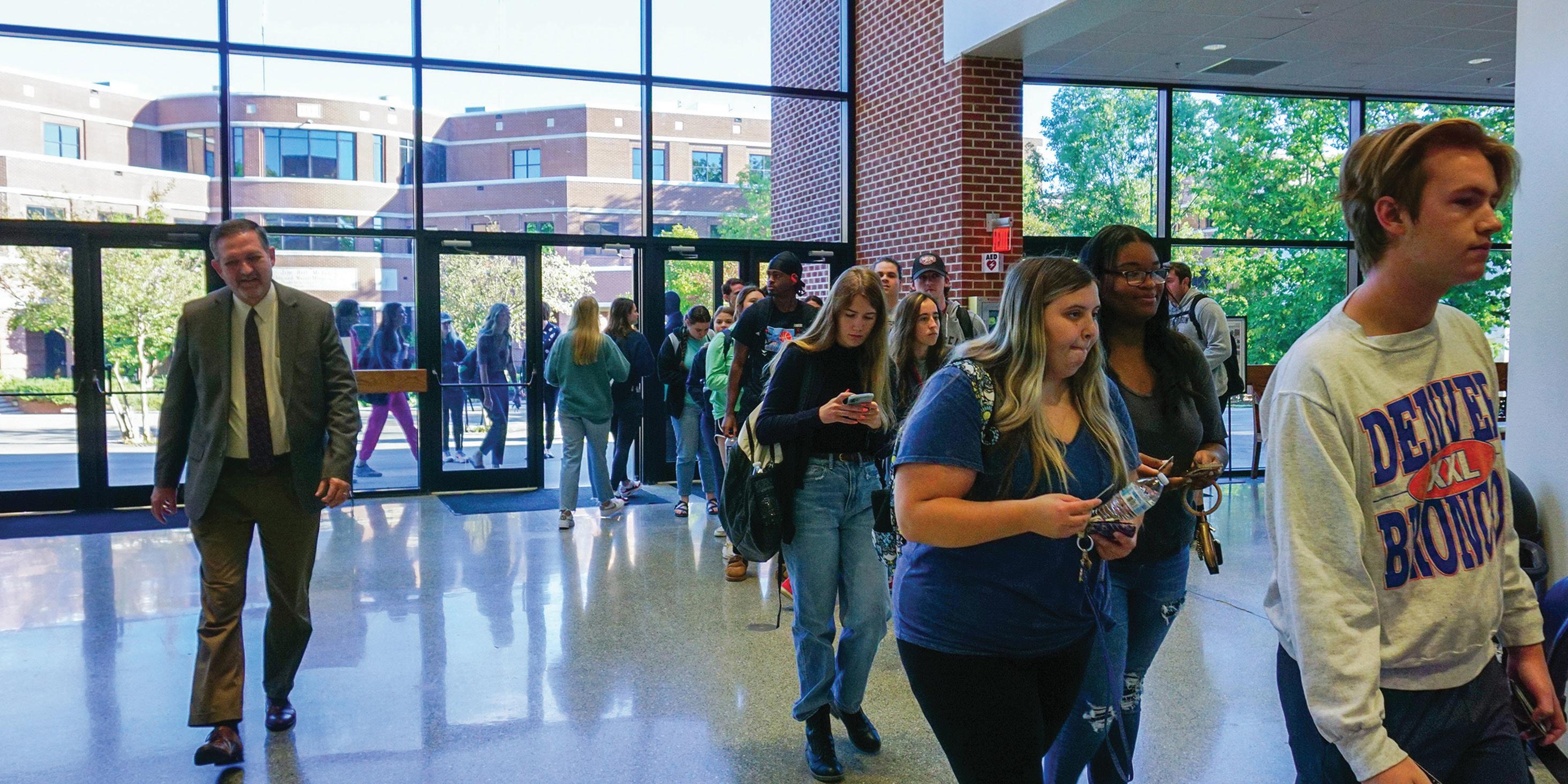
So they searched for other avenues and visited other private schools to observe how they recorded chapel attendance, including Faulkner University in Montgomery, Alabama, where Williams served as president before coming to Harding. Student Life soon opted to employ the swiping system, a program that Harding’s information technology staff developed, Abston said.
The new system is uploading attendance records to Pipeline in a shorter amount of time.
“So students can see their absence within two hours where they used to not see it all day,” Abston said.
With the new change came new job opportunities as Student Life needed students to help man the card readers. Abston said there are currently about 15 student workers.
“Matter of fact, we have a lot that have reached out asking for that position,” Abston said. “So I think it will be in demand.”
Senior Karrisa Neal said she has enjoyed her new job thus far.
“I may be the black sheep of the bunch, but I love it because I get to be one of the first people that everyone sees — if they’re coming through my door — on the way to chapel,” Neal said. “I think my spiritual gift is encouragement, so I really love getting to greet everyone in the morning.”
Students with scratched IDs may need to replace their cards at the Public Safety office, but Abston said those charges are covered by the University if the cards work properly everywhere else outside of chapel.
After attending chapel the Wednesday following the announcement, junior Zane Edwards said he feels it should not be his responsibility to swipe for attendance.

“I think if Harding wants to take attendance in chapel, they need to make a system where we just have to show up,” Edwards said. “And I think if the photo system was too time consuming, then they need to figure out a better way to do that. But I don’t like
having to scan in, and I don’t want to tap in. I don’t want to do anything but sit in my seat at 9 a.m.”
On the same day, senior Ashley Rehmel said she had mixed feelings about the new system.
“When I first heard about it in chapel on Monday, I was a little apprehensive because it’s new and new things typically tend to not work for the first several weeks that they’re in use,” Rehmel said. “And it kind of seemed like it might have held up the lines, but it went OK today. … I’m tentatively optimistic, and it is nice that it will make it easier on the people who don’t have to go in and count heads now.”
On Oct. 3, Light also revealed that students will continue to have assigned seating. Weeks prior to this announcement, Student Life gave students the opportunity to electronically vote on whether to keep their assigned seats, eliminate assigned seating altogether or establish a combination of both. Out of 1,612 students who voted, 21.84% advocated for a combination, 29.53% endorsed eradicating assigned seating and 48.64% voted to retain the status quo.
Senior James Phillips said he did not mind the results nor the new card reader system.
“The scanning system is fine,” Phillips said. “I think it would make more sense in conjunction with unassigned seating, but I like my assigned seat, so I like that it’s kept that way.
Relay for Life event to happen tonight

for those who have cancer, according to the HU Relay for Life Instagram page.
Students from different clubs and organizations have come together to organize Harding’s annual Relay for Life fundraiser, which is scheduled to kick off this evening on the Front Lawn with food, live music and activities to raise money and awareness for cancer research.
Senior Kaitlyn Rigsby, who has served as a Relay for Life co-director for the past two years, said the event will start at 5 p.m. with a dinner on the lawn for those who have survived or are battling cancer.
“That’s just a way of honoring them and remembering that our focus is for people like them, and their kids and sisters and husbands and wives,” Rigsby said.
The fundraiser will last until 5 a.m. tomorrow and will feature the theme of creating a world with more birthday parties
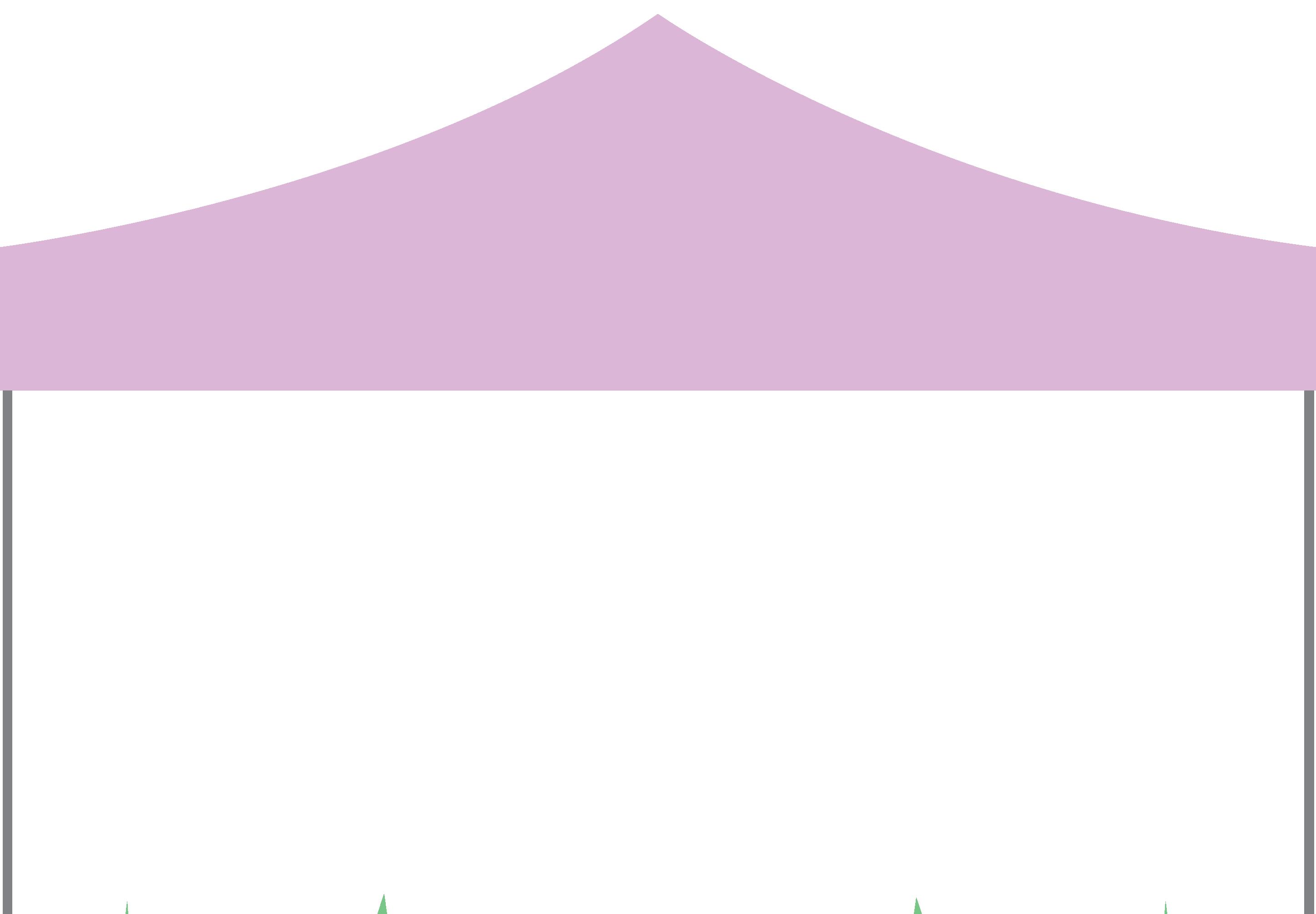
Rigsby said her favorite part of the event is the silent lap at 8 p.m. when people can line up and turn on tea lights inside luminaria bags, each one commemorating an individual affected by cancer. After that, participants will make one lap around the Front Lawn in silence.
Junior Elizabeth Thornhill, who is on both the fundraising and logistics committees for Relay for Life, said she hopes the silent lap will help participants gain a greater understanding of the impact cancer can have on people’s lives.
“I think it just kind of helps tie in with the story of ‘Tell the story’ of the [Student Association’s] committee, of just learning about the people around us and things that they may have gone through that we just don’t know,” Thornhill said.

Rigsby said she and her co-director,
senior Mason Adams, have worked with service directors for each social club and organization that will be running a booth at the event. Rigsby said women’s social club Jo Go Ju is bringing back their “pie a professor” booth, while women’s club Pi Theta Phi service directors, sophomores Camdyn Joice and Alli Wood, said they are teaming up with men’s social club Gamma Sigma Phi to bake and sell homemade pies.
Relay for Life will also feature live music, Rigsby said, including performances by Belles and Beaux, Rivers West and local singer Silas Carpenter.
Rigsby said she and Adams began planning the fundraiser this past summer. She said Harding’s Relay for Life committee has grown from five people last year to 20 people who have helped hang flyers, spread information by word of mouth and tell those in their communities about the fundraiser.
Sophomore Layne Medler, who signed
up for the survivor dinner, said she was diagnosed with kidney cancer when she was 2 years old. Although she was too young to remember the chemotherapy treatments she received, Medler said she recalled going to medical checkups growing up.
Medler said she went to the dinner last year and enjoyed being with a community of cancer survivors on campus, so she was excited to see students come together for this year’s event.
“I’ve grown up with Relay for Life events,” Medler said. “That’s just been a part of everything and my experiences, so I just really look forward to it and the impact it makes on everyone’s lives that’s been affected by cancer.”
Oct. 14, 2022 Vol. 98, No. 05 @HUStudentPubs Facebook: Harding University Student Publications
GABRIEL HUFF head copy editor
SOPHIE ROSSITTO news editor
Students line up in the Benson Auditorium lobby to swipe into chapel for the first time on Oct. 4. The new swipe-in system allowed for a more efficient use of resources in the Office of Student Life.
Photo by MACY COX
Graphic by COOPER TURMAN NEWS SPORTS FEATURES LIFESTYLE 2A 3&4A 1&2B 3B 4B OPINIONS Online at TheLink.Harding.edu Searcy, Ark., 72149 A HARDING UNIVERSITY STUDENT PUBLICATION THE THE NEWS . . . . . . . . . . . . . . . 2A OPINIONS . . . . . . . . . . 3&4A SPORTS . . . . . . . . . . . . . .1B COMMUNITY . . . . . . . . . . 2B FEATURES . . . . . . . . . . . . 3B LIFESTYLE . . . . . . . . . . . . 4B
Students connect with companies at career expo
More than 100 students attended this year’s Integrated Marketing Communication (IMC) Exposition in Cone Chapel Tuesday, Oct. 11, giving them the opportunity to pursue their career goals.
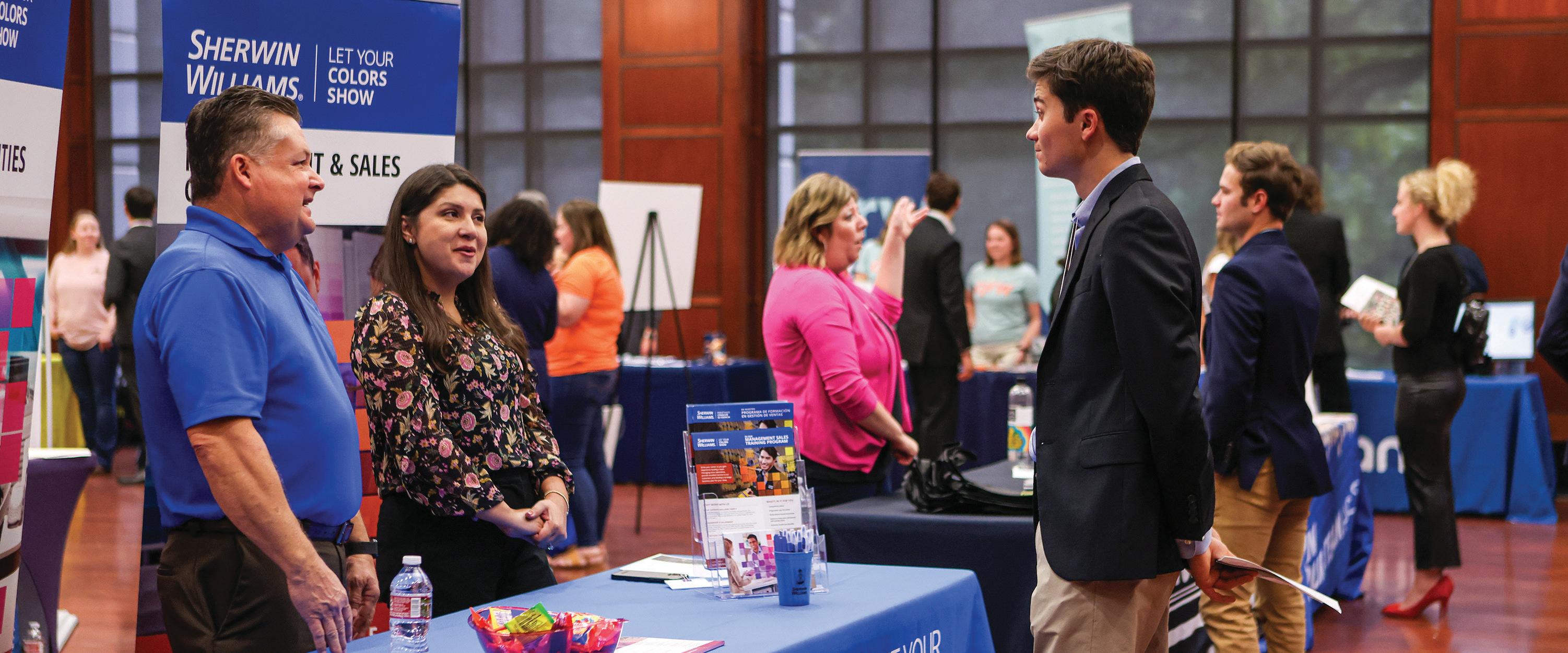
The IMC degree was initially approved in 2018. In the years since, there has been rapid growth in the area, as well as desire for new career options. This event encouraged students to speak with professionals in the field about the ways IMC skills are used in the industry. Some of the skills highlighted by the event are sales, marketing, advertising, graphic design and public relations. Last
year, 23 companies participated. This year, however, 30-plus companies lined Cone Chapel with professional opportunities for students. New prizes — such as the “Best First Impression,” won by students Kali Dennis and Tucker Lovell, and a raffle for Cody Johnson concert tickets — increased the traffic flow of the event.
“Last year’s exposition was building traction, I even had to beg several companies, but once they saw the quality of students and energy and experience, they wanted to come back,” assistant professor of communication and event organizer Lori Sloan said.
This sentiment was shared by recruiter and Harding alumnus, Alontis Andress.
“We always come to Harding because we know the students have the right mindset and good hearts, so we keep coming back,” Andress said.
For some students, this event is the first step to finding their future job.
“The goal is to get people talking and understanding the collaboration of working together,” Sloan said. “In any organization everyone needs to work together.”
Senior communication studies major Adam Dawidow came to the exposition to explore his options and was excited to see the areas of work.
“I’m trying to see if there is any overlap in my field,” Dawidow said. “First Orion seemed like just a tech company, but I talked

to a recent graduate, and he said they were looking for a broad spectrum of employees. There are a lot of creative options at entry levels, which I would value in a company. I’m drowning in business cards.”
One organization that was excited to come back was the Memphis Grizzlies. Account executive of Group Sales Ariel Mroz-Berwer was eager to connect with students for her second year at the event.
“The whole student body is a complete pleasure, and I love how excited they are to be here,” Mroz-Berwer said. “They are all super nice and professional, which is so refreshing to see.”
Liberal arts lecture series features topics on sports, spirituality
1985 on religious grounds and a hesitation over potential modesty issues in uniforms.
Four speakers opened Harding’s annual liberal arts lecture series in Cone Chapel on Oct. 4 with educational talks about sports and spiritual concepts.

The four-part Liberal Arts Colloquium series is held on Tuesday evenings and is led by history professor Dr. Julie Harris. The speakers for the first session of the Body and Soul of Sport lectures in Cone Chapel were Meredith Fear, head coach of women’s volleyball; Dr. Kevin Youngblood, professor of Bible and Ministry; Dr. Charles Bane, associate professor of communication; and Dr. Justin Bland, assistant professor of exercise and sport sciences.
Fear spoke on Title IX and its impact on sports.
“What happened in one generation for my mom, who was a great athlete, to not have opportunity here, to one generation later have three collegiate athletes for daughters?” Fear said during the event.
Fear said Title IX impacted Harding, and the president at the time, Dr. Clifton L. Ganus, filed for Title IX exemption in
“Harding was one of the first ones to write a Title IX exemption letter in 1976 by President Ganus,” Fear said. “I will be honest, as a woman, all the things that were in there were hard to read.”
Fear said that in spite of this, Ganus was a big supporter of the women’s volleyball team when she was an athlete at Harding and encouraged her after she took the head coach position in 2012.
“I had this little phrase pop into my brain that sometimes you can’t see the light until someone flips the switch for us, and there’s definitely been a wave of love and support and acceptance of our female athletes now,” Fear said.
Youngblood spoke on the biblical connection between body and soul. Youngblood said exercise has relevance to the soul because the body is the temple of Christ.
“We have tended to have, in Christianity, a less than fully integrated self with a kind of body-soul dysphoria, and it keeps reemerging,” Youngblood said.
Bane’s lecture was titled “There is a God and I’m not Him,” and he spoke on sports
films, specifically “Facing the Giants” and “Rudy.” Bane said these films communicate an idea of faith through the sports story.
Bane said “Facing the Giants” promotes a faith that says prayer will bring immediate satisfaction, while “Rudy” encourages a faith based on hard work and the knowledge that humanity doesn’t know better than God.
“God will always be there for you, but that doesn’t let you off the hook,” Bane said. “It’s also your job to inspire others around you to lift themselves up, and that’s a theology I think we can all get behind.”
Bland discussed the science behind exercise and the lifelong benefits that it can bring. Bland spoke on the cellular details of what happens in the body during exercise and the positive changes it can bring on a molecular level.
“Small decisions that you make make meaningful foundational changes,” Bland said. “What you do shapes you, and I mean that to the nth degree. What you do shapes you. You are not just physical; you are embodied.”
The second Liberal Arts Colloquium session was held Oct. 11, with a theme of “Analyzing Sports in Action.” The speakers were Dr. Steven Breezeel, Dr. Stephen Burks
Fire destroys home of Harding business faculty, family
A house fire consumed the home of College of Business instructor Rigel Page on the evening of Sept. 30 in the River Oaks neighborhood in Searcy. His son, Lane, was home when the fire started.
“I heard what sounded like a gust of wind … and I saw that the whole balcony was on fire,” Lane said.
He got himself and the family’s dog out of the house and immediately dialed 911. The Pages were running their smoker which is believed to have played a part in starting the fire, according to the family.
Rigel Page, his wife and their other two sons were on their way to a football game in Lonoke, Arkansas, when Lane called to inform them that their house was on fire
at around 5 p.m. They immediately turned around and drove home to find the Searcy Fire Department putting out the fire. Page said there was nothing left.
Associate professor of communication Dr. Charles Bane lives behind the Pages’ home and noticed the fire shortly after it started. He and his neighbors were hosing down the Pages’ shed in their backyard to hopefully prevent the shed from catching fire. However, the flames spread and the shed was destroyed. Searcy had not received a heavy rain since Sept. 3, causing extreme dryness.
“House fires are awful,” Bane said. “It’s less the physical home, because that can be rebuilt. It’s more the memories that have been lost and the very personal items that cannot be replaced is kind of where the devastation comes from.”
Bane said he and several other neighbors have reached out to the Pages offering anything they could need, like a place to stay, clothes, food or meals.
The Pages hope people understand their gratitude for all the support and help.
“The support has been tremendous,” Rigel said. “Whether it’s financial or students coming up here and saying we heard and we just want to pray with you. It’s just been tremendous.”
The Pages are living in a rental house until they find a permanent solution. Page said they will most likely rebuild their home on the same property, which could take at least six months.
“It’s unbelievable to us how much people have stepped up to help to a point where we are going to be fine,” Page said. “We are going to be OK.”
and Dr. Jake Stewart. The next colloquium will be held next Tuesday, Oct. 18.
Friday, October 14, 20222A NEWS
EMMA WEBER editorial asst.
MAGGIE SAMPLES lifestyle editor
Junior Tucker Lovell meets with representatives of the Sherwin Williams Co. at the IMC Expo in Cone Chapel on Oct. 11. Over 30 companies attended the expo to speak with and recruit Harding students.
Photo by MADISON MEYER
Dr. Charles Bane presents at the first session of the Liberal Arts Colloquium in Cone Chapel on Oct. 4. The theme of the event was “The Body and Soul of Sport.”
Photo by BALAZS BALASSA
Graphic by COOPER TURMAN EMILY STINNETT guest writer
Guest Writer Abbey Masters
T he problem of scarcity states that there are a finite number of resources, yet an infinite number of needs competing for those finite resources. It is a fundamental economic principle and a key driver of human behavior. We feel its weight each day as we try to meet needs ranging from hunger to social belonging. Maslow puts it best: As our basic needs are met, we pursue more complex ones, but the pursuit never ends. The problem of scarcity is inevitable.
Pretty much everyone on earth can agree that scarcity is an issue. It is how we solve this problem that divides us politically and ideologically. This piece is not political, so take a deep breath and relax. I’m not here for politics either. However, I do believe we let the problem of scarcity creep into other areas of life where it doesn’t belong.
Around this time every year, I have felt the pangs of scarcity in the club process. I am guilty of hyper-analyzing interactions with potential new members (PNMs). I wonder if they liked my club. I wonder if they liked me. I wonder if we will get a good pledge class this year. Are there enough girls doing the club process to go around? Certainly not, the problem of scarcity says, and so my imagination creates a competition, one that can be incredibly unhealthy.
Just like everyone else, I strategize and plan how to win over PNMs. I analyze my competitor’s approach, forgetting that this
Is the club process a competition?
“competitor” is a friend that simply wears a different jersey on Fridays.
It’s understandable why I would treat the club process as a zero-sum game. My primitive brain is wired to see social belonging as essential for survival, and that’s why rejection has such a bitter sting.
may not be the same as mine, but that doesn’t mean it isn’t equally as fulfilling, and it certainly doesn’t negate my own.
This year I have tried to push back on my brain senselessly applying scarcity. When anxiety breeds imaginary competition, I combat it by rooting for the good of another. After all, if there were more pockets of joy and contentment within each club, there would be less people competing for the same spots in a few clubs and higher distributions of people getting their first choice. Shouldn’t I root for that? Setting aside my pride sometimes makes this tough to do.
Russian lit and dumps
Leo Tolstoy’s “Anna Karenina,” often asserted as the best novel of all time, opens with this line: “Happy families are all alike; every unhappy family is unhappy in its own way.” If this is true, I have to choose between being happy and being unique. I feel like I grew up in a generally happy family, so whenever people talk about testimonies, I never feel like I can weigh in because I’ve had a silly, happy, mundane little life.
If they don’t like my club, that must reflect somehow on me. That must mean I made the wrong decision to be a part of this group. Unconsciously, I gauge the number of PNMs interested in my club to tell me if I made the right decision. If lots of people pick my club, that must mean I have somehow achieved some higher sense of social belonging, right?
That’s pretty backward if you ask me. I’m happy where I am. I have great friends, and I don’t need to look to external metrics to confirm my contentment.
Because I have been blessed by the community I have found, I want others to have as great of an experience as I have had. Sometimes I lose sight of the fact that someone else’s ideal Harding experience
There are also 874 new students this semester and 722 students participating in the club process, according to Allyson Feather, the administrative assistant to the deans. This means endless potential for new friendships regardless of if you belong to a social club. Let us not succumb to the lie of scarcity, but instead, live freely in the abundance of opportunity for friendship and connection. Club process or not, Harding is filled with amazing people. A new friend could be just around the corner; if you refuse to break down the walls competition creates you might miss out.
ABBEY MASTERS is a guest writer for The Bison. She may be contacted at amasters@harding.edu.

As someone who values my individuality and the uniqueness of every creature, it makes me uneasy to think I might be like Ned Flanders of “The Simpsons” just because we both have happy families. I want something drastic to happen to separate me from the blind faith or altruism that comes with the connotation of a “happy family.” I, as a happy person, am condemned to writing the same types of papers, working desk at Allen Hall, making a slightly different devo for my social club and working at the same silly little dumpling shop every weekend. Unhappy people, though, have several options. Affairs, addictions, abuse or general meanness distinguish one unhappy person from another, and as much as I hate to be like Ned Flanders, I certainly don’t want that either.
As someone who wants to be happy and also be a good person, I tend to evaluate my life fairly often, and when I must remind myself of what makes me happy, it’s not the things that distinguish me from other people.
The Tyranny of Merit or The Aristocracy of Talent?
T he day is coming where each of you will be eager to hear the words from our provost congratulating you on the “degree you have earned.” Today, some are questioning whether you will have truly earned it.
I have just finished reading two books: Michael Sandel’s latest titled “The Tyranny of Merit: What’s Become of the Common Good?” and Adrian Wooldridge’s “The Aristocracy of Talent: How Meritocracy Made the Modern World.” I always find it beneficial to read two opposing perspectives on the same topic back-to-back. Sandel’s previous work, “Justice,” was a big hit a few years back. Wooldridge’s previous book, co-written with former U.S. Federal Reserve chief Alan Greenspan, also a success, covered the history of capitalism in America. Both of those books had value, though they each had some disappointing arguments. I have given both authors another chance to impress and teach me.
waste and oppression. Spawned by the Reformation and the Enlightenment, consecutive revolutions transformed society by removing group-specific rights and replacing them with individual rights. This opened the door for anyone to increase chances of success regardless of one’s status at birth. This also created a meritocratic environment in which many barriers certainly remain, but the historical record is quite convincing. Meritocracy has lifted the many. Achievement based on the combination of ability and effort has a strong track record.
cynical at best. In my experience, the achieving people work to help those who don’t achieve and lift their opportunities to join them. The most competitive societies are the most philanthropic.
I do not think about the time I was a drum major for my high school marching band and we won first place, or when I got beauxed, nor the time I was on the Acropolis gazing at the Parthenon. Instead, I think about when my friend Maddy and I would read poetry and talk about why we thought it was pretty, or when Josh makes a fart noise in the library to make me laugh, or when Erin makes a silly face at me in Bible class, or Michael when he smiles wide at me every morning in the Student Center. I cannot afford to think of the extraordinary, because it does not happen enough. Instead, I must think of the ordinary, everyday goods that sustain me from one moment to the next.
I have to say, after reading both books, that Wooldridge won this battle–and handily. By choosing to look at meritocracy from a historical perspective, he was convincing in persuading me that a person’s position in society being dependent on one’s ability and skills is a novel concept, absent from most of human history. Rarely had anyone risen above his or her status at birth. This lack of meritocracy brought about suffering, corruption,
Sandel loses the argument because he completely disregards history (a dangerous strategy) and focuses simply on luck and power. In fact, he proposed a return to aristocracy (which explains Wooldridge’s title), where it’s clear that one’s rise in society is clearly due to good fortune (birth) and is not earned. I ended up unconvinced by Sandel’s ideal perspective that merit is oppressive, though it sometimes certainly could be. Despite his correct assertions that the elite tend to thumb their nose at the working class through credentialism, it is still the old losing argument of collectivist thinking over individual achievement, seeking to fit in rather than standing out. He attributes success to luck, even though scientific research into luck has revealed that luck tends to be made. Sandel says that merit is tyrannical, because it is unearned. But so is grace, which is the opposite of tyrannical.
The Samaritan had seemingly fewer positive inputs in his life than the priest and the Levite, yet it’s what he did with these inputs, of his own volition, that made him good. Not perfect, but good. Sandel’s view that those who achieve believing they earned it will start to oppress those who don’t is historically misleading and

When asked about what we can do to solve today’s challenges, the answer, as with the Samaritan, is within each one of us taking this responsibility personally. We’re all dealt a different set of cards. We must demonstrate care personally, individually, with the tools we have been given. That has merit. And that merit is the opposite of tyrannical. It is hopeful, compassionate and good. Sandel has not proved his point. He should have looked to history, as Wooldridge did, and taken a higher view of humanity.
Many of us are here at Harding because someone had the heart of the Samaritan to personally invest, care and provide for us to forge a path through Christian education. Your scholarship was possibly merited, but aren’t we all at some point the beaten man on the side of the road? Now, regardless of the inputs we have received, let’s make the most of them and redeem the time. Let’s complete our “earned” degrees and aim to be good Samaritans.
DAVID KEE is a guest writer for The Bison. He may be contacted at davidkee@harding.edu.
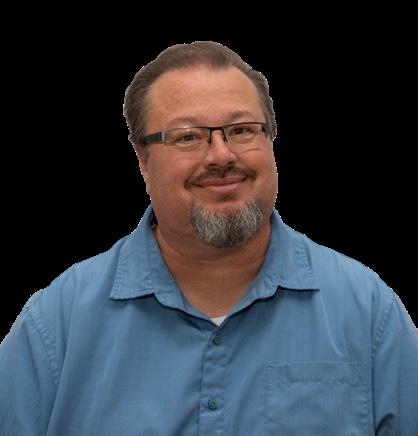

The most monotonous part of my week, Sunday nights, also serves as the most lifegiving. I feel the same wind on my face every week as I bike to Sladers to make dumplings. It seems simple, but there is something about working with my hands for 10 hours a week that is not just working but also becomes a ritual of praise for the fact that I am a human being capable of something as simple as making food for another. To echo G.K. Chesterton, there is beauty in monotony the same way God does not copy and paste every daisy or every sunset but never gets bored making them from scratch.
Higher churches (Catholicism, Anglican, etc.), designate times and places as holy. The tradition I grew up in had an aversion to that, saying, “Why should we celebrate the birth of Christ any more on Christmas than we do the rest of the year?” Then, in an attempt to make every day more holy to match Christmas and Easter, we only profane them and barely celebrate them at all. Living a life that feels monotonous is just the same.
We cannot allow what is monotonous to profane what is holy, so we must view every day as a holy day and every place a holy place. Reading books is no longer for the purpose of making a grade, but to gaze at a new facet of the infinite God; singing in the shower is no longer an excuse to enjoy the hot water longer but a way to feel like I am a person; making dumplings is no longer what I do to make $11 an hour, but it is a ritual I perform in service to God as a way to sustain the human beings he has created. Even if it makes me just like everyone else, the ordinary goods of human life are what give me my humanity.
MALACHI BROWN is the opinions editor for The Bison. He may be contacted at mbrown33@harding.edu.
staff guest contributors Emma Jones editor-in-chief Sara Hook features/layout editor Sophie Rossitto news editor Ben Lane sports editor Malachi Brown opinions editor Maggie Samples lifestyle editor Gabriel Huff head copy editor Cianna Jay asst. copy editor Emma Weber editorial assisstant
Madison
Meyer head photographer Balazs Balassa asst. photographer Macy Cox asst. photographer
Gracie Cornett cartoonist
Bonnie
Spann
business manager Cooper Turman graphic designer
Wagner Valdez
asst. graphic designer Stacy
Roibal
beat
reporter
Emily
Stinnett historian
April Fatula faculty adviser Michael Claxton narrative columnist
Watkins Kelly
Erin
Marshall
Carter Thweatt Emily Stinnett Abbey
Masters
Micah
Gill David Kee
Opinions Editor Malachi Brown
What’s good
Business David Kee
Faculty Finds
– Abbey Masters, senior
When anxiety breeds imaginary competition, I combat it by rooting for the good of another.
– David Kee, faculty
We must demonstrate care personally, individually, with the tools we have been given.
Graphic by Cooper Turman
TheLink.Harding.edu OPINIONS 3A
Celebrating womanhood
Ihave been thinking a lot lately about womanhood; the blessings and tribulations, the loves and hates, the joys and burdens that all go along with it. A lot of events have happened over the past several months that have made it especially hard for me to celebrate being a woman — but I am trying to learn how to better embrace and celebrate my womanhood, even in the face of struggles both on a local and global scale.
Growing up, I struggled to express my femininity. I have four younger brothers. I was perfectly content to do most everything with them, and when I did bother to do something like dress up and have my mom curl my hair, I’d get comments from other family members about how I “actually looked like a girl for once!” so I tended to not appreciate the attention that came with girlish activities. In fact, I tended to scorn those I felt dedicated themselves too much to their femininity — the girls who woke up early to do their makeup before school, who didn’t play any sports or who wore tighter fitting clothes (not in an inappropriate way, just in an “I’m comfortable with the fact that I have breasts” way, which I was not). I’ve grown a lot since then, and have become comfortable embracing my own femininity and appreciating how other women express theirs. How wonderful that we can all share the title of “woman” and express it so differently. There is no specific way to be a woman; your womanhood is defined by your own characteristics and qualities and how you choose to define yourself. A wonderful aspect of womanhood, however, is the community aspect of it. I feel both the same and so different from other women I know, but the sameness outweighs and gives beauty to the differences.
Like the quote I included at the beginning of this column, I have grown to love being a woman. I love the similarities and connections that I feel are present in the global community of women that I do not see as much in men. Though being a woman feels so difficult sometimes, it is encouraging to know that it is a burden shared by many — and the joys of being a woman are joys that are understood and also celebrated by many. I’d like to share some reasons why I have grown to love my womanhood.
Womanhood is the handmade quilt from my Meemaw that I have on the couch in my office. Womanhood is attending a devo when my friend Libby is preaching, and womanhood is feeling empowered when other women can use their spiritual gifts. Womanhood is tearing up when I saw Boticelli’s “Birth of Venus” because Venus’s body looked like mine. Womanhood is wearing sundresses in the summer and doing a little twirl so it flares up around my legs. Womanhood is crying over rom-coms with my roommates, and womanhood is learning how to braid hair in the seventh grade locker room. Womanhood is when I stop at a gas station at night and feel more at ease when there’s a woman working at the register. Womanhood is learning how to play Barbie with my little girl cousins because I didn’t when I was little. Womanhood is knowing if I start my period and don’t have a tampon, I will be able to get an extra from someone. Womanhood is complimenting another woman’s outfit in public, and womanhood is doing my makeup in the same mirror as someone else. Womanhood is reading “Pride and Prejudice” for the first time and already knowing that I’m going to love it. Womanhood is being proud of my accomplishments and those of other women around me.
Men, I cannot speak to the experiences of manhood, but I hope that you find joy in your own existence and also learn to celebrate the women in your life. Women, please celebrate your femininity. Find the things you love about being a woman.
EMMA JONES is editor-inchief for The Bison. She can be contacted at ejones19@harding.edu.
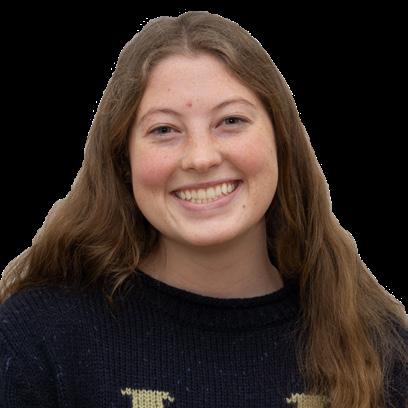
Notes from an achievement society

 Guest Writer Micah Gill
Guest Writer Micah Gill
Why are we so busy? Most people in contemporary U.S. society, especially college students, feel busy (research it if you don’t believe me). Our schedule quickly fills when we try to split our time between academics, extracurriculars, work, relationships and maintaining our physical, mental and spiritual health, not to mention the time spent planning for the future and trying to serve those around us. It’s no surprise that nowadays when we ask people how they’re doing, “Busy!” is often a go-to response. Yet, as Dr. Monte Cox likes to point out, this common answer is rarely a solemn admittance of an oversaturated schedule, but rather a point of pride.
Why are we proud of our busyness? We have not always prided ourselves on being a society of resume boosters, speed walkers, multitaskers, LinkedIn curators and coffee guzzlers. For the roughly 250 years leading up to the mid-20th century, we were in what French historian Michel Foucault called a “disciplinary society,” which imposed society’s values and expectations on its people by force and coerced obedience. Outside forces compelled and threatened people to fall in line and to make “progress.” Though there are some remnants of disciplinary society still intact today, Byung-Chul Han, a South Korean philosopher, explains how today’s society has shifted: “Twenty-first-century society is no longer a disciplinary society, but rather an achievement society,” he writes in his book “The Burnout Society.” If you don’t believe him, note the change in today’s characteristic institutions from the past: “Today’s society
is no longer Foucault’s disciplinary world of hospitals, madhouses, prisons, barracks and factories. It has long been replaced by another regime, namely a society of fitness studios, office towers, banks, airports, shopping malls and genetic laboratories . . . prohibitions, commandments and the law are replaced by projects, initiatives and motivation.” Society no longer forces us to be productive members; we now force ourselves.
If we see our lives as unimportant without hard work, we will naturally enslave ourselves.
– Micah Gill, senior
Why are we so busy? Perhaps a better question is, “Why do we force ourselves to be so busy?” Primarily, we feel that we must be busy. We compel ourselves to busyness because, in our achievement society, busyness, productivity and “excellence” are our standards of importance. If we see our lives as unimportant without hard work, we will naturally enslave ourselves to “the grind.” Han puts it similarly: “The reaction to a life that has become bare and radically fleeting occurs as hyperactivity, hysterical work and production.” We members of achievement society have starved our lives of their intrinsic value and have tried and failed to create a new virtue called “efficiency” to make up for it. Really, efficiency is a vice.
When we hyperactively achieve to make ourselves important and valuable, we show that we do not trust the meaning ascribed to our lives by the Gospel. Our distrust of the Gospel detaches us from “being” characterized by peace, simplicity and gratitude, and instead imprisons us into a false “becoming,” characterized by strain, complexity, burnout and discontentment. How far is this from Jesus’ example? Nowadays, we are too busy to break away and pray for hours like Jesus made his common practice. We are too busy to stop and show love to others by listening to them, like Jesus did for the woman at the well. How many hours did Jesus spend pouring into the lives of his disciples? It seems strange to even imagine Jesus thinking about sacrificing his time because his entire purpose on earth was “not to be served but to serve” (Mt. 20:28). What if we thought about our lives the same way? Did Jesus frantically speed-walk around Galilee? Somehow, I don’t think so. As Dr. Ross Cochran often says, “Hurry and love are fundamentally incompatible.”
Those of you who know me may be surprised that I am writing this article. The reality is that I am an imprisoned member of an achievement society, just now waking up to see the chains which bind me to “the grind.” I will admit that we are sometimes (but not as often as we think) called to busyness. This is a dangerous calling, though, because busyness, while not bad, makes it harder to be good.
MICAH GILL is a guest writer for The Bison. He may be contacted at mgill2@harding.edu.
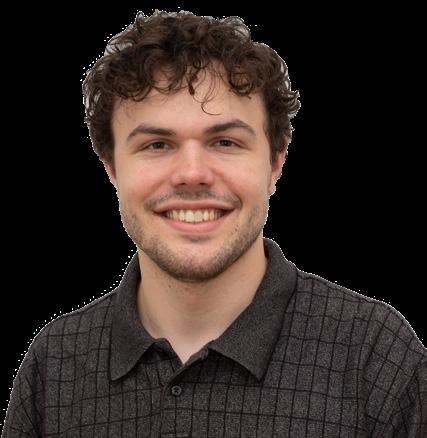

In a classic episode of “Everybody Loves Raymond,” Marie has had enough of her lazy, boorish husband. When he loudly demands a pot-roast sandwich, she says — for the first time in their marriage — “Make it yourself.” Frank is stunned, but she’s not finished. “I’m onto you,” she adds.
“You pretend to be stupid so I’ll wait on you hand and foot. Well, it’s over.”
Ray, fearing that his own wife will follow suit, urges his father to fight back, asking, “Dad, are you just gonna take that?”
Frank shrugs. “45 years,” he says, “I had a good run.”
I thought of that last month when I had a “come to Jesus” meeting with my doctor. To be clear, I was the one in need of redemption.
You see, a long time ago, a friend gave me some advice. “You can eat whatever you want until you’re 50,” he said. While I doubt many nutritionists would endorse this plan, I followed it to the letter. I have had a glorious half-century as a Southern gourmand, eating the food you read about in the Bible: sausage, country ham, cornbread, casseroles, peach cobbler. Though I wouldn’t go as far as comedian James Gregory — who once said, “I was a teenager before I realized that gravy was not a beverage” — I seldom saw a saturated fat I did not like.
Life was good. The All-Star Breakfast at the Waffle House could cheer any sorrows, and most problems could be solved by some soulful reflection and a Zebra Cake. And don’t get me started on the all-you-can-eat pizza place.
But now I am 50. With high cholesterol and a family history of heart disease, I’m afraid the buffet has to close. And it’s time to pay the bill.
I have accepted this. I am grateful that my doctor is trying to save me, and I will adjust in time. But acceptance does not mean I have to like it. In fact, I need at least six months to mourn.
I sat in silence as my new diet was explained. It involves nothing fried. No fried chicken, fried pork chops, fried catfish, fried pickles or fried egg rolls. No French fries, waffle fries, curly fries, crinkle-cut fries or sweet potato fries. I must cut way back on pastas, pizzas, breads, potatoes and desserts. No more Super Nachos Fajita or Sweet-and-Sour Chicken. No grease, fat, Crisco or butter. Frankly, I was waiting for the naughty list to include “joy.”
I also must exercise more. When I mentioned that I often enjoy a leisurely morning stroll picking up trash in the neighborhood, the doctor commended my civic spirit but said that I had to quicken the pace. I thought that bending over to gather soda cans would burn a few calories. As it turns out, I need to walk faster to get my heart rate up. It did little good to explain that I am an English teacher, which means that my heart rate is always up. Every runon sentence raises my beats-per-minute something awful.
But no dice. Like the lemur king in “Madagascar,” I’ve got to move it, move it. So if you see me passed out in a cul-de-sac, surrounded by uncollected garbage, please call my doctor.
I am grudgingly making changes in the kitchen. I baked some chicken, roasted some vegetables and ate a sugar-free cookie. I am cooking with olive oil and choking down salads. Last week I had a chickpea. I’ve even cleaned out the pantry. The low point was the day I threw out the Frosted Mini-Wheats. I played “Taps” in my head as all that powdered goodness tumbled into the wastebin.
Dozens of well-meaning people have reassured me that soon I won’t crave fatty and sugary foods. Perhaps. I hear that prisoners sent to solitary confinement are told the same thing: “You’ll get to where you hardly miss other people.”
But I will certainly miss some folks. I’ve said goodbye to Shirley at the Cracker Barrel, to Hazel at the Waffle House and to that guy — whoever he is — who keeps the cheese sticks flowing at Mazzio’s. We had some good times, didn’t we?
And so, as I slouch into the twilight, nibbling on almonds and spinach leaves, slowly turning into a gerbil, at least I have poetry. Wordsworth celebrates the power of memory to comfort us during our troubled adulthood as we reflect on a sweeter, more innocent past. For him, it’s rainbows and daffodils. For me, it’s potato salad and sweet iced tea. Even in the throes of yet another lousy bite of cauliflower, my mind goes back to the glory of country fried steak.
But Michael, aren’t you gonna fight this?
No, after a month of this new diet, I’m too weak to fight. But it’s OK. I had a good run.
MICHAEL CLAXTON is a guest writer for The Bison. He can be contacted at mclaxto1@harding.edu.
Until you’re 50 At The Bison, it is our goal to serve the Harding University student body with integrity, truth and open ears. However, we believe that meeting that goal is a two-way street between our staff and the public it serves. We pledge to keep our eyes and ears open to what our community has to say and hope that, in return, that community will be an interactive audience, sharing its stories with us. We also pledge to do the basics: Report accurate and relevant information, check our facts, and share them in a professional, timely manner. If you have any story ideas, questions, comments or concerns for The Bison staff, please email Emma Jones, the editor-in-chief, at ejones19@harding.edu. “The Bison (USPS 577-660) is published weekly (except vacations, exams and summer sessions), 20 issues per year, by Harding University. Periodicals postage paid at Searcy, Arkansas 72143. POSTMASTER: Send address changes to The Bison, Harding University 11192, SEARCY, AR 72149-0001.” BYLINE POLICY: The Bison provides an opportunity for class writers to contribute work under the byline “guest writers.” Due to this arrangement, staff writers may rewrite a portion of the guest writers’ stories as they deem necessary, while still identifying the work as the guest writers’ own. Friday, October 14, 20224A OPINIONS Editor-in-Chief Emma Jones Ten Thousand Words Illustration by Gracie Cornett
Narrative Columnist Michael Claxton
“How I love being a woman!” -Ruby Gillis in “Anne with an E,” Season 3 Episode 5, 40:07
Graphic by Cooper Turman
Statement from The Bison
On Sept. 30, The Bison unknowingly published an article containing a fabricated quote regarding the outcome of the Harding versus Ouchita Baptist University football game. The Bison has retracted this article, and it has been removed from our website, The Link.
The Bison takes fabrication very seriously, and we were deeply disappointed to learn one of our writers did this. Upon learning of the fabrication, The Bison removed the article and began the process of reviewing the writer’s previous articles.
The Bison is undergoing an internal review of its editing procedures and is working toward strengthening these procedures to ensure that this does not happen again.
We strive to uphold a journalistic standard of excellence, and we regret this error. As journalists and Christians, our first obligation is to the truth. We have a responsibility to the Harding community to maintain a reputation of credibility, and we apologize to any parties this fabricated quote offended.
Heart of the Hogs
It’s tough to be a Razorback fan today. After suffering an embarrassing 17-40 defeat to Mississippi State University last Saturday, my high hope for a successful season was unequivocally tarnished by the agonizing realization that the Hogs simply do not play at an elite level.
But they are my team and have been since I was young. It’s odd that I, like many other Arkansans, possess a fighting spirit for a team that historically loses in make-orbreak situations. Even odder is that I have only attended one Razorback sporting event in my life: a football game the year after Bobby Petrino disgracefully exited in which Arkansas lost to Rutgers University 35-26 at Razorback Stadium. Further, the stadium is the only part of campus I’ve set foot on.
The most entertaining part of that game did not occur on the field, but instead one seat behind me, where a presumably drunken and angry fan shouted across the field, “Sit down Snooki!”
It’s this unabashed, unearned and arguably undeserved pride my stadium buddy sitting behind me so concisely presented when shouting “Snooki” that makes me a Razorback fan. Even though the air was thick with heartbreak and the heat was stifling, I could see through the suffocating atmosphere and gazed upon the heart of the Hogs. Razorback fans stick with their team. They fight for them, even if the Razorbacks do not obviously deserve to be fought for.
Everyone, sportsperson or not, can take a lesson from this Razorback spirit. It’s important to support the people and things you care about because without support, without the key characteristic of strong fortitude during difficult times, nothing will ever fulfill its potential.
After all, Arkansas is no longer the worst team in the SEC. Though they are nowhere near an elite level, nor are they ranked, the Razorbacks scratched and clawed their way into becoming a respectable team, and I cannot help but believe that the collective consciousness of Razorback fans, which permeates a supportive and fighting spirit, was a key component in the formation of the Razorbacks as they are now.
I don’t mean that this collective consciousness manifested a respectable football program. That is a ridiculous “spooky language” notion that belongs in the realm of hauntings and other ridiculous wee-woo not accurately applicable to the human experience. What is less spooky is that the collective consciousness creates an underlying electric atmosphere, which Razorback players are subject to and is all important to any successful athletic sport.
Razorback fans must maintain their fighting spirit, even if the team loses to Brigham Young University tomorrow, because it is essential to the success of the team.
Lady Bisons set win-streak record
WATKINS KELLEY guest writer
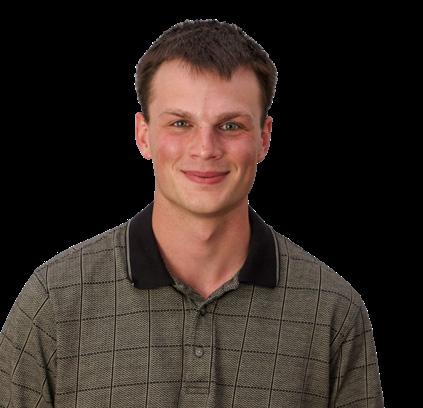
The Lady Bisons volleyball team set a school record of 18 straight wins with their defeat of the Southwestern Oklahoma State University Bulldogs 3-1 (23-25, 25-23, 25-20, 25-16) on Oct. 7. The team continued to hold on to their first rank in the Great American Conference (GAC) with an undefeated record in conference play and at home. With the win against the Bulldogs, the Lady Bisons moved to an overall record of 20-1.
The 18-game winning streak broke the previous record of 17 that had been accomplished by both the 2002 and 2005 teams.
Much of the Lady Bisons’ success this season can be attributed to the nine seniors returning to the team. Head Coach Meredith
Fear said the class’s experience brought the team confidence going into this season.
“We knew with so many returners that we could hit the ground running,” Fear said.
“We didn’t have to spend a whole lot of time learning our system or getting used to the team chemistry; that was all very established.”
Following week seven of the season, the GAC announced the three Players of the Week were all members of the Lady Bisons.
Senior middle blocker Kelli McKinnon was named offensive player of the week, senior libero Emma Winiger was named defensive player of the week and senior setter Sarah Morehead was named setter of the week. Five separate players on the Lady Bisons volleyball team have received a player of the week award this season, with McKinnon and Morehead having both received more than one.
Senior outside hitter Chloe Ingersoll said the senior class has stepped up as leaders not just in gameplay, but also in practice.
“For our senior season, we’re trying to be super present,” Ingersoll said. “I’ve seen the positivity on and off the court, and we’re all holding each other to a character accountability, not just playing accountability.”
Along with word spreading of the Lady Bisons remarkable record, the team has worked to bring fans in with themed games or special events. The team hosted both a teacher night and a youth night in the Rhodes-Reaves Field House this past weekend.
The Lady Bisons traveled to Oklahoma yesterday for a game at Oklahoma Baptist University which is ranked second in the GAC. Today at 4 p.m. the team visits Southern Nazarene University.
The next home game will be held Oct. 25 against Ouachita Baptist University, when the team will be hosting a “Heart of Howie” night to honor former student-athlete and coach Molly Howard-Gerwig, who died on Oct. 16, 2021, following a short battle with colon cancer.
Fear said she hopes the team will use the momentum they have built up this season but also make sure they are slowing down and playing one point at a time.
“Our approach is that we have a confidence that we can beat everybody that we play,” Fear said. “But we also have the respect that we can be beaten by anybody that we play. I think finding the balance between those two things — of coming in confident but keeping the pressure on the other team and not on ourselves — is what we’re trying to do.”
Freshman defensive specialist Camdyn Hinton echoed her coach’s sentiment as she looked forward to the rest of the season, including the conference tournament.
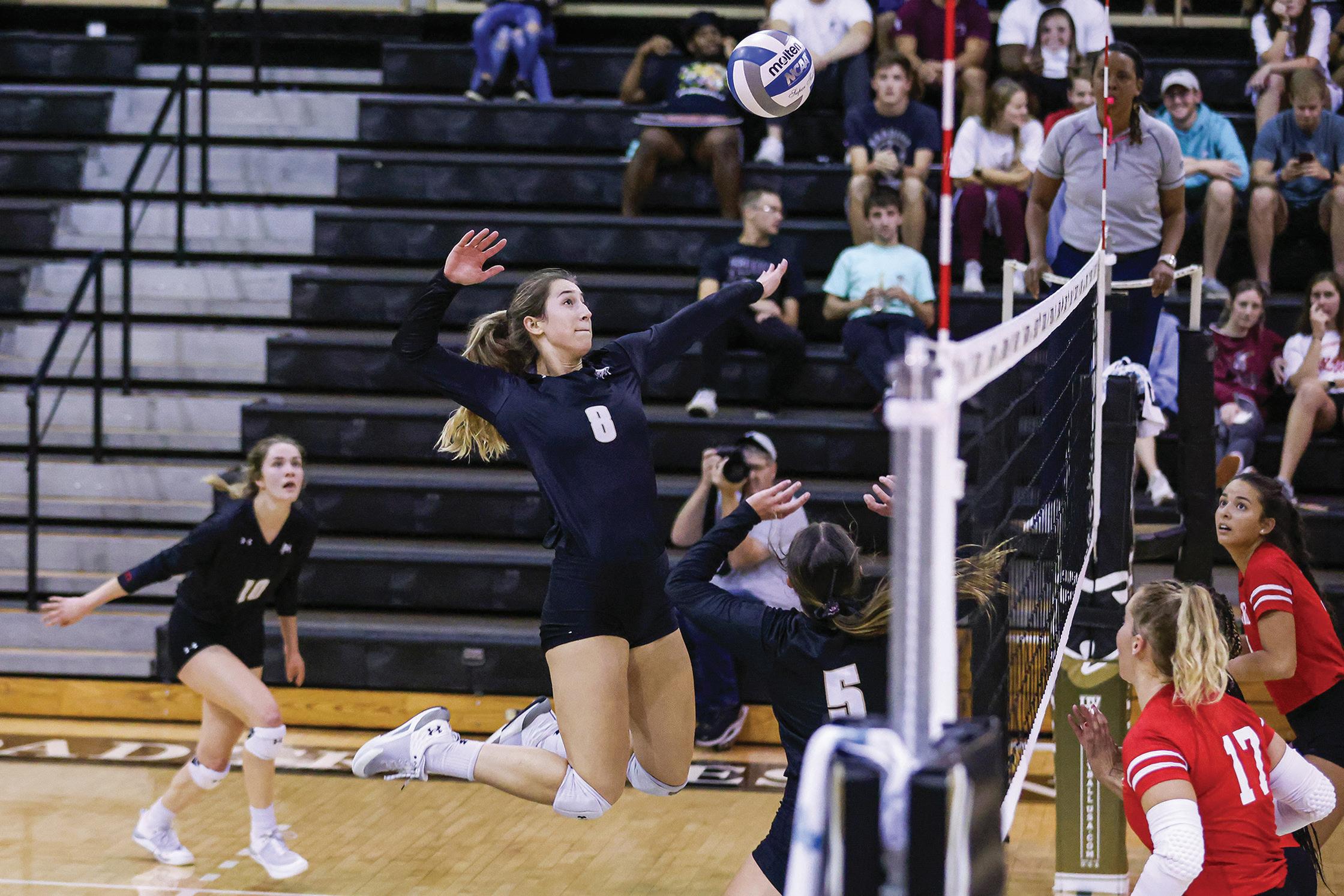
“Something that Coach Fear preaches is that just because we have a good record doesn’t mean we can’t go in and not expect a battle,” Hinton said. “Every team we play in the GAC is so talented in their own way, so we have to be prepared.”
Brothers share field, awards
CIANNA JAY asst. copy editor
For the last three years, sophomore running back Will and his brother, graduate student and defensive back Grant Fitzhugh, have played on the Harding Bisons football team together, an experience that has been full of achievements.
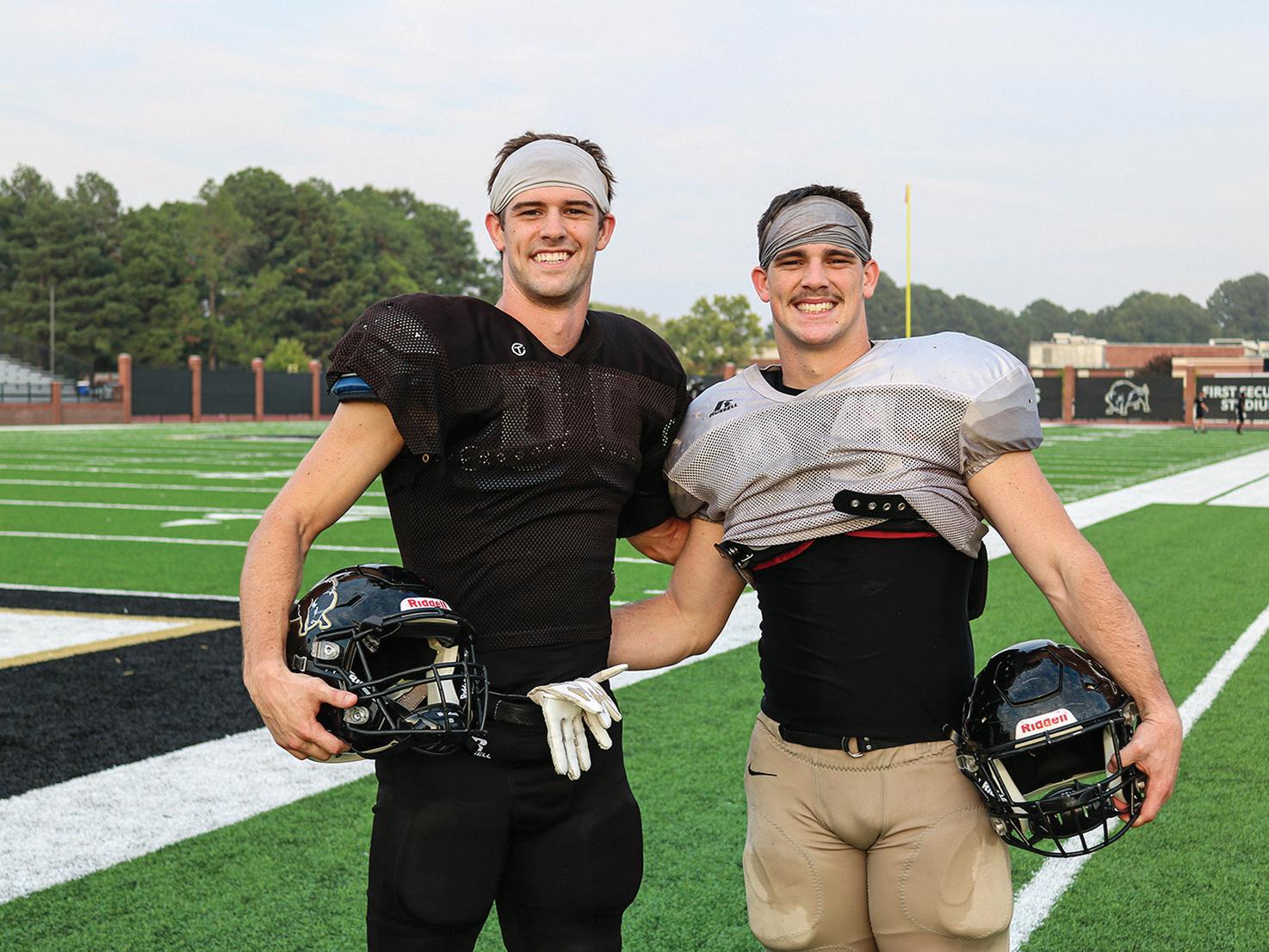
Both brothers have been awarded the American All-GAC award, and recently, Grant was named a Campbell Trophy Semifinalist.
“The Campbell Trophy recognizes an individual as the absolute best football scholar-athlete in the nation for his combined academic success, football performance and exemplary leadership,” an article on the Harding sports website said.
The Fitzhughs grew up with football as an integral part of their lives, from playing football in their backyard in Sterlington, Louisiana, to spending time around the locker room with their football coach father and later playing on the same team at their high school.
“We would play games pretty much every Saturday during football season,” Grant said.
“I think we had like 100 plays in our playbook.
… We would play the [Thanksgiving] Turkey Bowl. Ice Bowl anytime it got cold. … Dad would make up bowl games and play in the front yard. So those were some fun times.”
When the COVID-19 pandemic began, the brothers were preparing to play on the same team again since Will was an incoming Harding freshman. Because gyms and weight rooms were closed, the Fitzhughs had to train together on their own. Will said this experience brought them closer to each other.
“We were at the house together all the time, and we just had to make up crazy workouts to do,” Will said. “We would get in the neighbor’s yard; we’d [play] tug of war against each other. We’d be blasting Jeremy Camp, listening to him in the garage. We were just kind of making our own workouts and pushing each other to be better.”
Will and Grant described the spiritual growth that began connecting them during this time and has continued through their time on the team.
“I think we’ve been able to grow a whole lot as men of God because of each other,” Grant said. “I’m really thankful for how I’ve
grown because of Will. … We share football, but really, we share our love for the Lord above all. … That’s been really special to have that together and to grow together in that. And I think we’re better men because of each other. And Harding football is a big part of that.”
Will shared a similar perspective on how playing on the same team has impacted their relationship.
“It’s a blessing to be able to play on the same team, be in the spot we’re in,” Will said. “I think it’s definitely something we’ll always have good memories of.”
Online at TheLink.Harding.edu Searcy, Ark., 72149 A HARDING UNIVERSITY STUDENT PUBLICATION THE THEVol. 98, No. 05 Oct. 14, 2022
Kelli McKinnon jumps before spiking the ball over the net during the Oct. 6 game against Northwestern Oklahoma State University. The Lady Bisons defeated the Rangers 3-0.
Photo by MADISON MEYER
Brothers Will and Grant Fitzhugh stand on First Security Stadium football field Oct. 11. Both brothers play for the Bison football team.
Photo by BALAZS BALASSA
Sports Editor Ben Lane
BISON STAFF
Coffee options in Searcy expanding

7 Brew, which is based out of northwest Arkansas,, will be occupying the building on Race Avenue where Nova Joe’s was located. 7 Brew’s menu includes seven signature coffees, energy drinks, shakes, smoothies and more.
In the last few weeks, Searcy has seen some changes to several coffee shops around town.
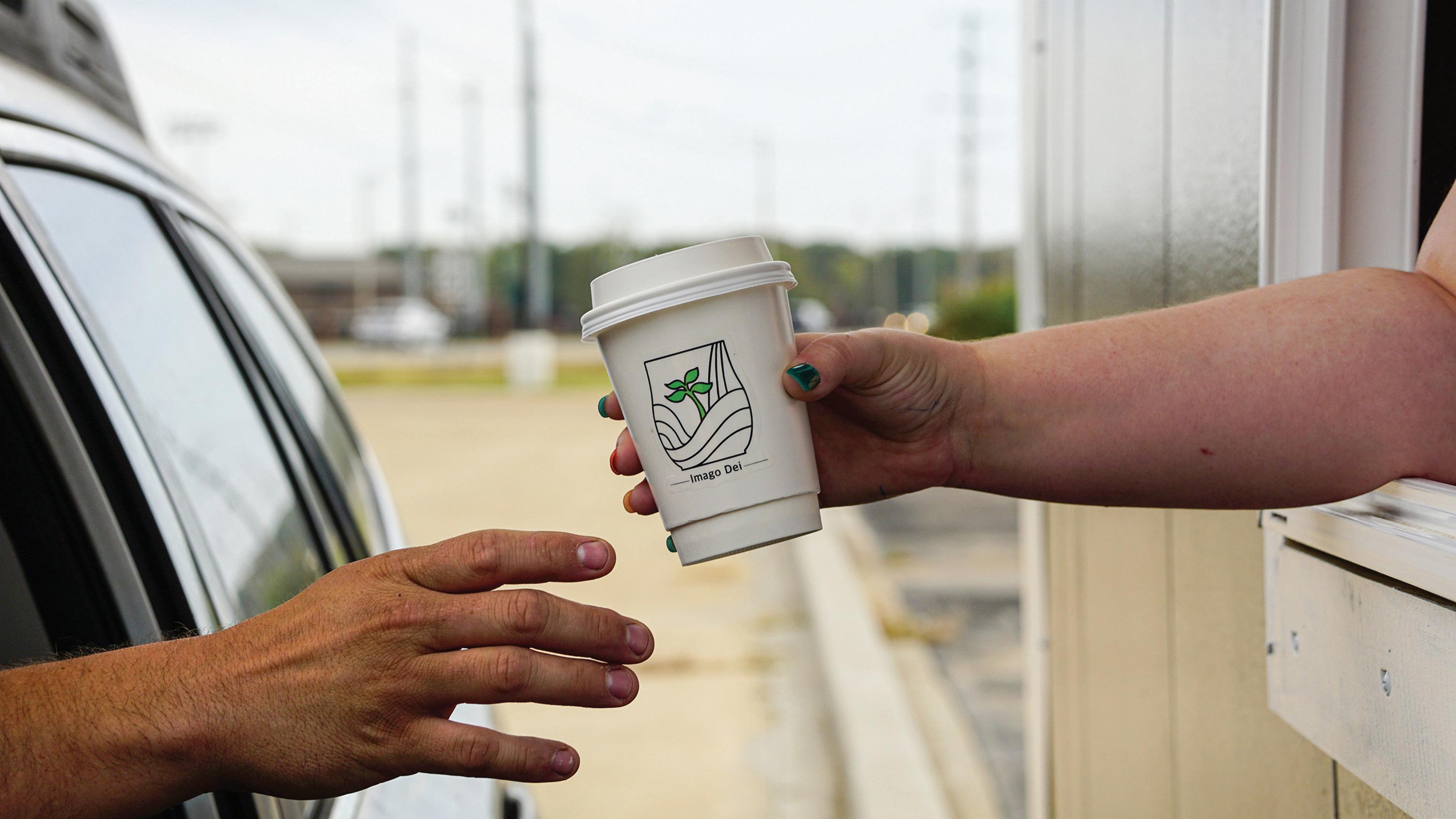
On Sept. 30, Nova Joe’s announced via Instagram that their Searcy location would be closing after being approached to sell by 7 Brew, another drive-thru coffee company.
In the post, Nova Joe’s cited challenges in making their store concept of producing both coffee and chicken work in a small building. The Batesville, Arkansas, based company came to Searcy in June 2021.
Senior Nick DeLapeña, who worked as a shift manager at the Searcy Nova Joe’s, said employees were not given much warning of the store’s closing.
EMMA JONES editor-in-chief – Drew Ritger, COO of 7 Brew
“We heard from 7 Brew’s announcement that they had bought it out [before] we heard from the owner,” DeLapeña said. “We got a call the day we closed that four hours later … we needed to close up shop for good. The store manager from Batesville came [the next day] to pick up all the syrups and the chicken and all the equipment we had to bring back to Batesville. They cleaned up shop in like 36 hours.”
Gift cards and rewards points can still be used at the Nova Joe’s in Batesville, according to the company’s post.
“While we are grateful for Nova Joe’s service in Searcy, we’re thrilled to be further expanding our footprint in the Little Rock market,” Drew Ritger, COO and director of franchising at 7 Brew, said in a press release from the company Sept. 29.
We’re thrilled to be further expanding our footprint in the Little Rock market.
The store is scheduled to open in early 2023 and will feature a double-lane drivethru and outdoor seating.
Senior Emma Kate Horton, a native of northwest Arkansas, said she is excited for 7 Brew to come to Searcy, as it is her favorite place to get coffee at home.
“I was in complete shock [when I learned] that 7 Brew was coming to Searcy,” Horton said. “I think the Searcy community will like 7 Brew because it is a super fast, cheaper
option of coffee and other treats that other shops in town haven’t been able to give to the community.”
7 Brew will be hiring over 40 employees for its Searcy location in the coming months. For more information about hiring, contact 7 Brew at www.7brew.com.
In other coffee news, Imago Dei, a coffee shop located inside Fellowship Bible Church on Beebe Capps, opened a new drive-thru location on Oct. 10. The main store opened in July 2021 with the intent to bring big-city-style coffee to Searcy, and the owners began working on the drive-thru in January 2022.
Matt Kiefer, co-owner of Imago Dei, said the shop’s mission is to provide wholebean coffee for churches.
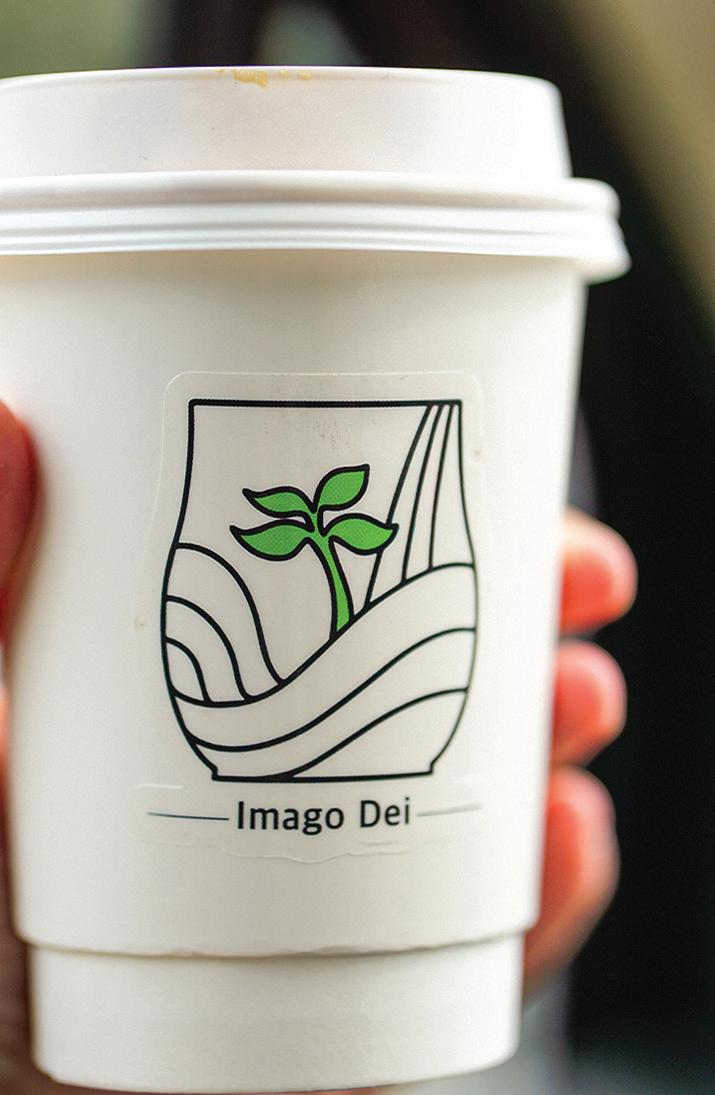
“We want to generate enough green purchasing power to offer farmers nonprofit microloans in African regions and empower the future of coffee farming,” Kiefer said.
Senior Mary Kathryn Asencio said she thinks the drive-thru’s location being close to both Harding’s campus and the entrance to Highway 67 makes it convenient for different customers.
“Everyone I have spoken to has been really excited about having the drive-thru option,” Asencio said. “Multiple customers told me they were particularly excited to grab coffee on the way to work.”
A community based plan for the future
Searcy holds 20-year planning meeting
EMMA JONES editor-in-chief
Searcy held an open planning meeting on Oct. 4 in conjunction with consulting firm Crafton Tull to gain community insight in the first step to forming a 20-year plan for the city. A total of 313 people attended.
The Searcy City Council had discussed for some time hiring an outside consultant to form a city plan and voted in May to hire Crafton Tull, a civil engineering and consulting firm based out of Little Rock, Arkansas.
City council member David Morris, who previously served as mayor of Searcy for two terms, said the firm came highly recommended.
“They have a wonderful reputation, and they’re very knowledgeable,” Morris said. “I think they’ll do an excellent job.”
Morris said some people have asked why a plan with such a long time frame is needed. He said 20 years may seem like a long time, but is needed to help the future generations of Searcy.
“To me, one of the most important aspects of this 20-year plan is planning the infrastructure as Searcy grows,” Morris said.
The city planning meeting was held at the Carmichael Community Center and was formatted with interactive booths that allowed community members to give input on what they wanted to see for the city’s infrastructure, biking and walking trails, and park system. The event also had a kid zone and an area outside the center with bounce houses and hamburgers.
“We really wanted as many people as possible from the community to come, so we tried to make it more than just a boring meeting,” Searcy public relations manager Michelle Pugh said.
Crafton Tull will take the information gained from the meeting and use it to make an official city plan, a process that should take about a year, city planning and development director Richard Stafford said. He said there will also be a few more forum-style community meetings to touch on specific topics from the Oct. 4 meeting that may need more clarification or input.
“This is hopefully going to give us an idea that’s community based, that gives us plans and ideas for the future,” Stafford said. “I hope it’s something that the community can
all get behind because they were the ones that gave input.”
Dr. James Huff, associate professor of engineering and Honors College fellow, said he appreciated the interactive nature of the planning session.
“From a user perspective, it’s a great way for a lot of people to engage and provide insight,” Huff said.

Friday, October 14, 20222B COMMUNITY
ERIN MARSHALL guest writer
Alumna Morgan Gianferante works the new Imago Dei drive-thru on Oct. 12. The Imago Dei drive-thru is located in the parking lot of the Imago Dei store.
Photos by MACY COX
Bike Gang rolls through campus
If you’ve been on Harding’s campus or the streets of Searcy on any Sunday night recently, there’s a good chance you’ve seen the “Bike Gang” riding around. This group of Harding students has gone on bike rides every Sunday at 6:30 p.m. for the past few weeks. They’ve had as many as 30 people, but as junior Ella Duryea said, it didn’t start that way.
“It started out as different groups of people, and we were going on bike rides a lot in these smaller groups,” Duryea said. “And we thought, ‘Wouldn’t it be awesome if we just took over the road and got a huge group to go?’”
Sophomore Sam Gooch also helped the group get started, and he said he wasn’t sure if it would ever become as big as it has.
“It really was just a few people in small groups when it started,” Gooch said. “But it’s turned into a really big thing, which is awesome.”
Junior Mallory Shelton said there are many things she loves about Bike Gang. However, she mentioned that she especially enjoys the time of fellowship that it provides, as well as the break from school.
“My favorite thing about Bike Gang is that it’s just a really great time to see your friends,” Shelton said. “You’re also doing something really relaxing, like a little study break. And I feel like it’s not something you would normally see college students doing around.”
The Bike Gang has been on many rides already this school year, but Duryea said one stuck out to her — the first one they did.
“The very first one, we were riding through campus,” Duryea said. “And anyone we saw on a bike or on a skateboard, we told them to join us. It was just a strange feeling, like we were taking over campus with our bikes, but it was so fun.”
Duryea said the group growing in numbers has been exciting, but the Bike Gang also tries to switch things up every week to keep it interesting.
“We take different routes every time to kind of switch it up,” Duryea said. “But it’s already cool because it’s just a group of people who get together, have some fun and get some exercise.

According to those in charge, the Bike Gang will continue to meet at Warehouse 4 on Sunday nights at 6:30 p.m. before leaving to ride around Searcy.
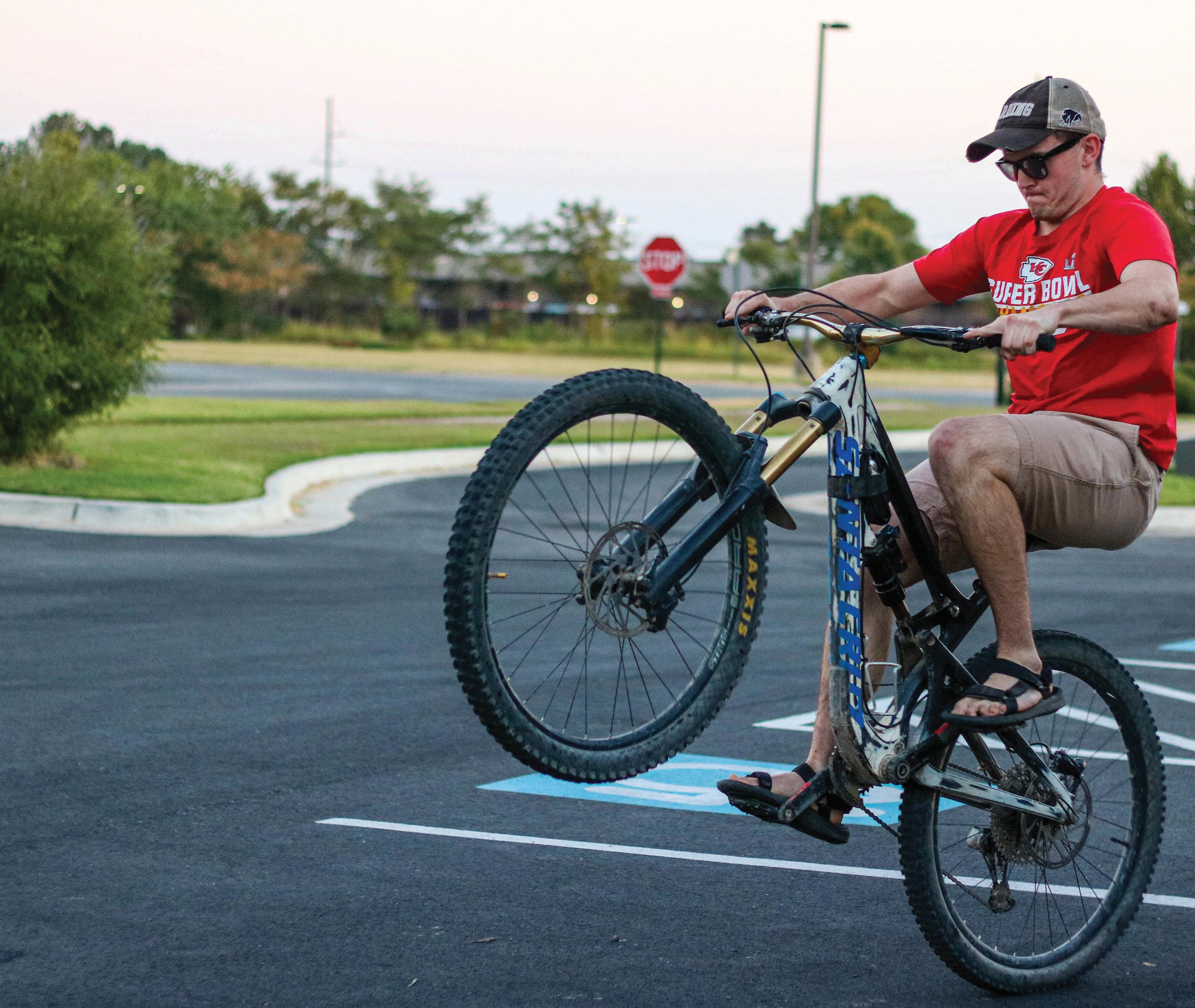
‘One of the highlights of college so far’
Downtown singing encourages students
and are not worried about quarantining due to COVID-19 anymore.
Every Sunday night, students gather at Downtown Church of Christ for Downtown Singing, an hour of worship and communion. The weekly event has seen a resurgence since the COVID-19 pandemic ended. While anyone is welcome to come, the service is mostly geared toward college students, where they can get away from the stress of classes and relax in the fellowship of their peers to praise God.
“Before [COVID-19], we, as in university programs, saw church attendance decline as a whole,” senior Levi Huddleston, one of the worship leaders for Downtown Singing, said. “After [COVID-19], when we first started back up in the spring of 2021, we had about 250 students a semester attend, and as of this semester, we’ve been averaging about 650 to 700 students a semester.”
Huddleston said he thinks a reason behind the rise in attendance is because students are not required to wear masks
“ I feel like we’ve also remained very consistent in providing a highquality worship service to students,” Huddleston said. “It’s become a place where students just want to be there.”
Alumna Makyla OviedoRodriguez, who worked alongside Huddleston during her time at Harding, said she didn’t know what to expect when Downtown Singing returned in 2021.
Graphic by COOPER TURMAN
“We were really worried about the lack of people who would be there because it had been so long,” OviedoRodriguez said. “Right before the pandemic started, what we saw separately, people pulled away from Downtown Singing, whether that be faith differences or not necessarily feeling connected to the spirit.” OviedoRodriguez said that when Downtown Singing returned, they restarted it with a purpose.
“We’re going back to the simplest form it can be: give it to God and go down to the
heart of worship,” Oviedo-Rodriguez said.
Junior Caleb Shockley, who took over after Oviedo-Rodriguez graduated, wasn’t at Harding before the pandemic. However, he was one of the many students positively affected by the revival of Downtown Singing.
“I love it,” Shockley said. “It’s been one of the highlights of college so far for me. I know I was hesitant at first, but we do this for the students. You come together with your friends, sing with them and just get excited about Jesus together. That’s awesome.”
For someone whose college career is in the rearview mirror, Downtown Singing is one of the biggest things Oviedo-Rodriguez misses.
“I miss Harding, and I have made my good parting with the University, but I still get brought to tears about how much I miss Downtown Singing,” Oviedo-Rodriguez said. “I felt more challenged in my time working there than anything else.”
American Studies Institute celebrates 70 years
From presidents to prime ministers, editors to authors and surgeons to athletes, the American Studies Institute (ASI) has brought in various leaders from across the world and nation to Harding’s campus.
Seventy years ago, the School of American Studies, which over the years morphed into what is now ASI, began at Harding. Though no longer a school, ASI still brings speakers, hosts events and takes students on school trips.
“We’d like to help inspire leadership by exposing students to people and places and ideas that have helped shape the United States,” Dr. John “J.R.” Duke, executive director of ASI, said.
ASI exposes students to this, Duke said, by creating discourse about American history, capitalism and economics or engaging in politics and government, which is intended to inspire engagement with civic life.
In 1952, then-president George Benson
told The Bison that the new school, which offered a four-year degree with a blend of courses in history, science and economics, aimed to give “a solid grounding in American and Christian principles.”
Similar to today’s ASI, the school gave students the opportunity to hear speakers, participate in discussions and attend school trips.
Harding still offers an American studies major, though the school no longer exists. The school was located in the American Studies Building, where the English Department now resides, and was the first all air-conditioned classroom building in Arkansas.
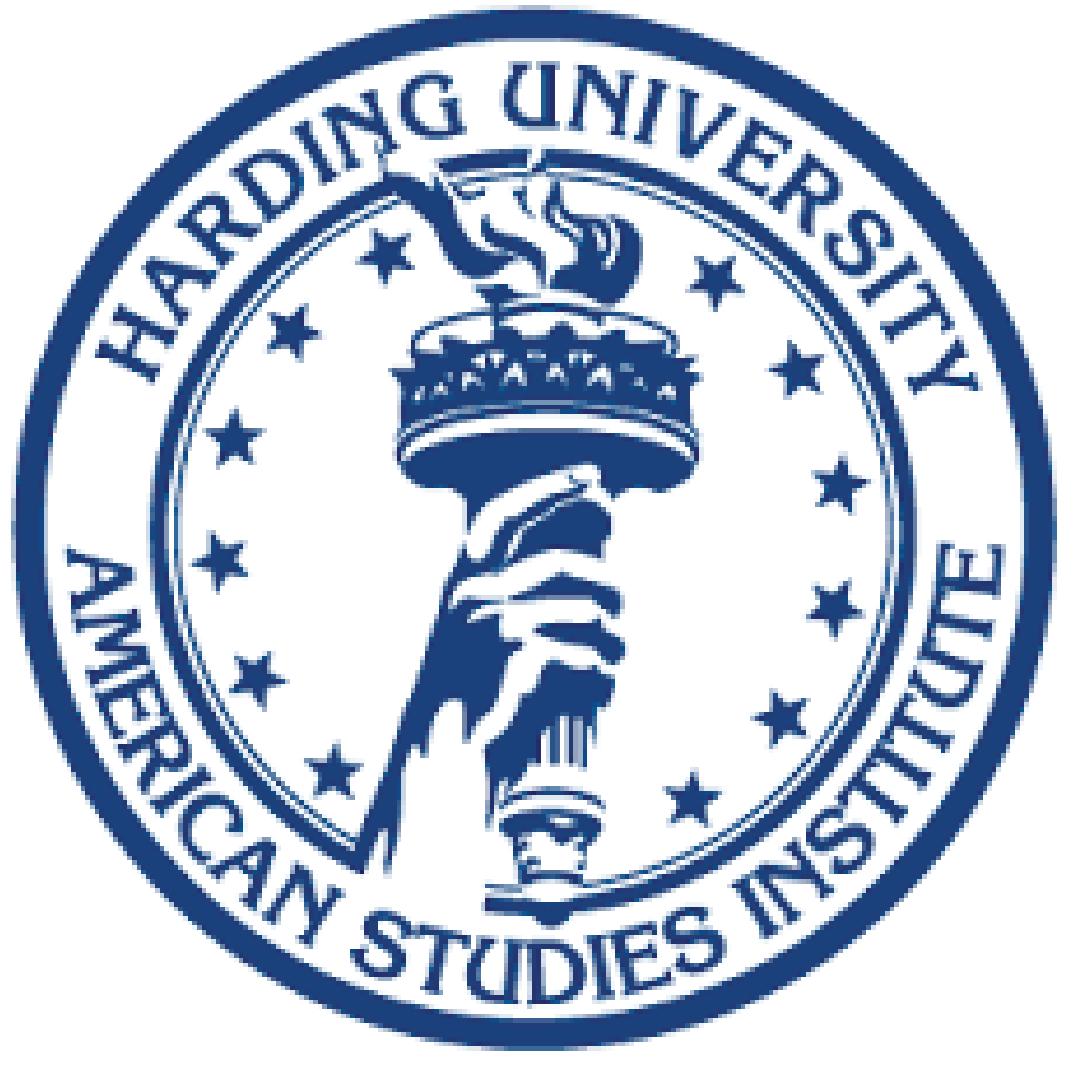
Duke said that during the 1950s, schools of American studies began appearing across foreign and domestic universities in an academic movement.
Harding’s school was funded by philanthropist W.R. Coe, who promoted American studies across the nation.
“The American Studies Institute continues this long tradition by promoting a better understanding of the constitution, of capitalism and free enterprise and of the intersections of faith and civil life,” ASI’s webpage states.
Retired vice president Dr. Jim Carr said ASI developed into one of the most “outstanding speaker series in higher education in the
country” during his involvement and that it was impressive for a school the size of Harding to bring speakers such as Benazir Bhutto, Margaret Thatcher and Mikhail Gorbachev.
Senior Grant Countess said ASI “has been a huge part of [his] Harding experience.”
“ASI has given me the opportunity to listen to people’s stories,” Countess said. “It begins with the speakers who come to share their experiences and offer their perspective on the world.”
ASI most recently brought Joe Kennedy, a high school football coach embroiled in a religious liberty Supreme Court case, and his lawyers Stephanie Taub and Michael Berry.
The next ASI speaker event will occur on Nov. 2 and feature former South Carolina Governor David Beasley, executive director of the Nobel Peace Prize winning United Nations World Food Program. Further information can be found at https://www. harding.edu/american-studies-institute.
BEN LANE sports editor
Graphic courtesty of Harding ASI TheLink.Harding.edu FEATURES 3B
CARTER
THWEATT guest writer
Senior Ethan Day pops a wheelie on his bike in the Warehouse 4 parking lot on Oct. 9, 2022. Day and the rest of the bike gang meet on Sunday nights to go for a group ride.
Photo by BALAZS BALASSA
BISON STAFF
Swing dancing provides connections, energy to students

said they have really been enjoying the experience.
On an evening in early September, freshman Colby Covalt taught fellow freshmen Corban Cherry and Denver Mitchell how to swing dance in their dorm. After learning the basics, they decided to go out to the front lawn to continue dancing.
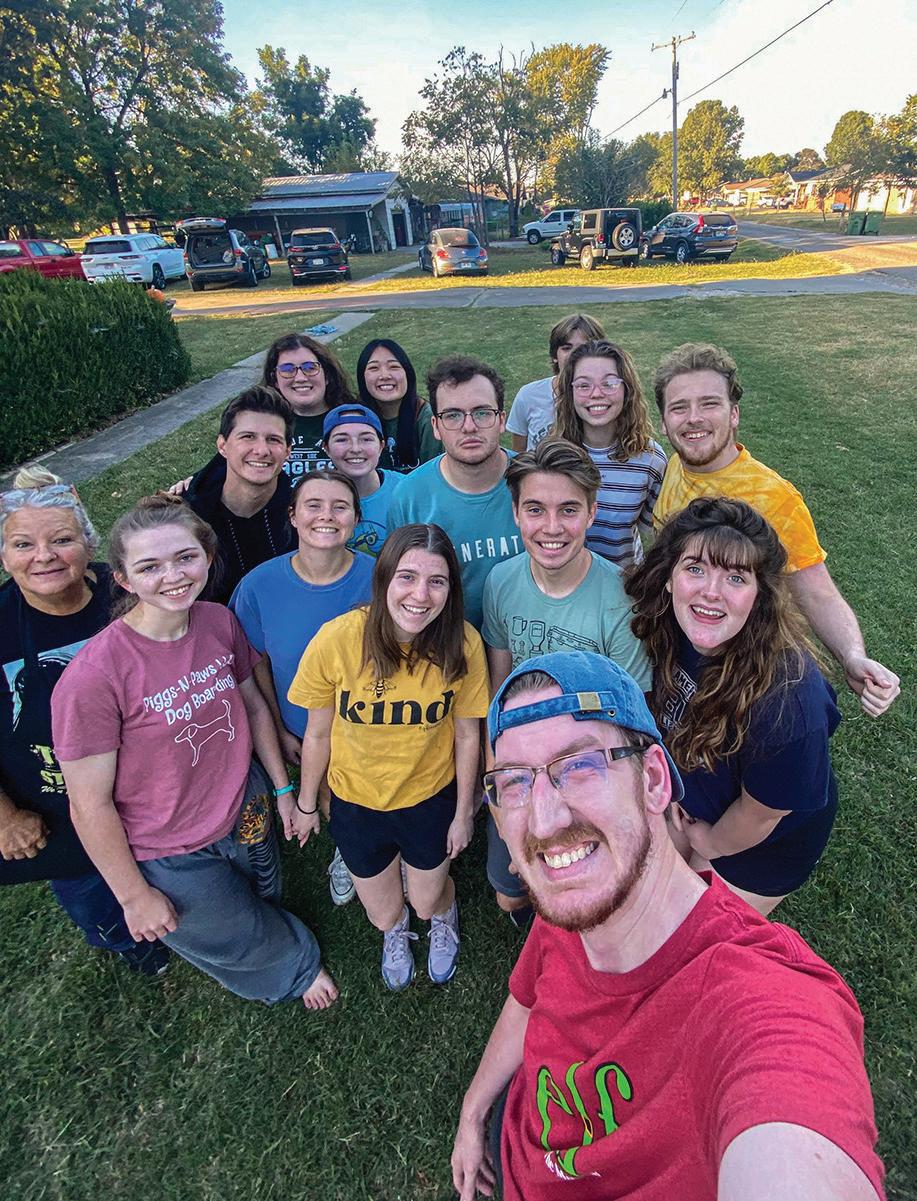

“ This is one of the most spontaneous things ever … we saw someone walking down this sidewalk and we were like, ‘Hey, do you want to swing dance?’ and they were like, ‘Yeah’” Mitchell said.
They started calling out to more people walking by and encouraged them to bring their friends the next night.
Cherry said his only dancing experience was when his sister took a cotillion class and taught him how to waltz. Mitchell s aid his experience with dancing was “literally none.”
Mitchell and Cherry continued to learn by watching videos and invited
people throughout the day to come back and dance each night.
“A week later that Friday, we had 120 people,” Cherry said.
Sophomores Ella Smith and Laura Wilson have become regulars after
being invited by Cherry and Mitchell. Smith said they approached her in the Charles White Dining Hall one day and encouraged her to come. Despite having no experience, Smith and Wilson decided to come out and learn and
“It’s just really fun,” Smith said. “It’s fun to watch other people learn, too.” Wilson agreed.
“Watching them [Mitchell and Cherry] attempt these crazy, ridiculous moves with other people who don’t know what they’re doing is a really good time,” she said.
Mitchell said his favorite swing dancing move is “the pretzel” and Cherry said his is “the flip.”
“It’s a good study break quite frankly,” Mitchell said. “I’m a STEM major, so I really value this because it pulls me away from my homework for a bit and almost provides more energy than the rest I could potentially take,” Mitchell said.
People are regularly meeting at 10 p.m. on Tuesday nights to swing dance. For the latest updates on dates and times, check out their Instagram page @hu_countryswing.
Students take advantage of Oct. 7-9 fall break

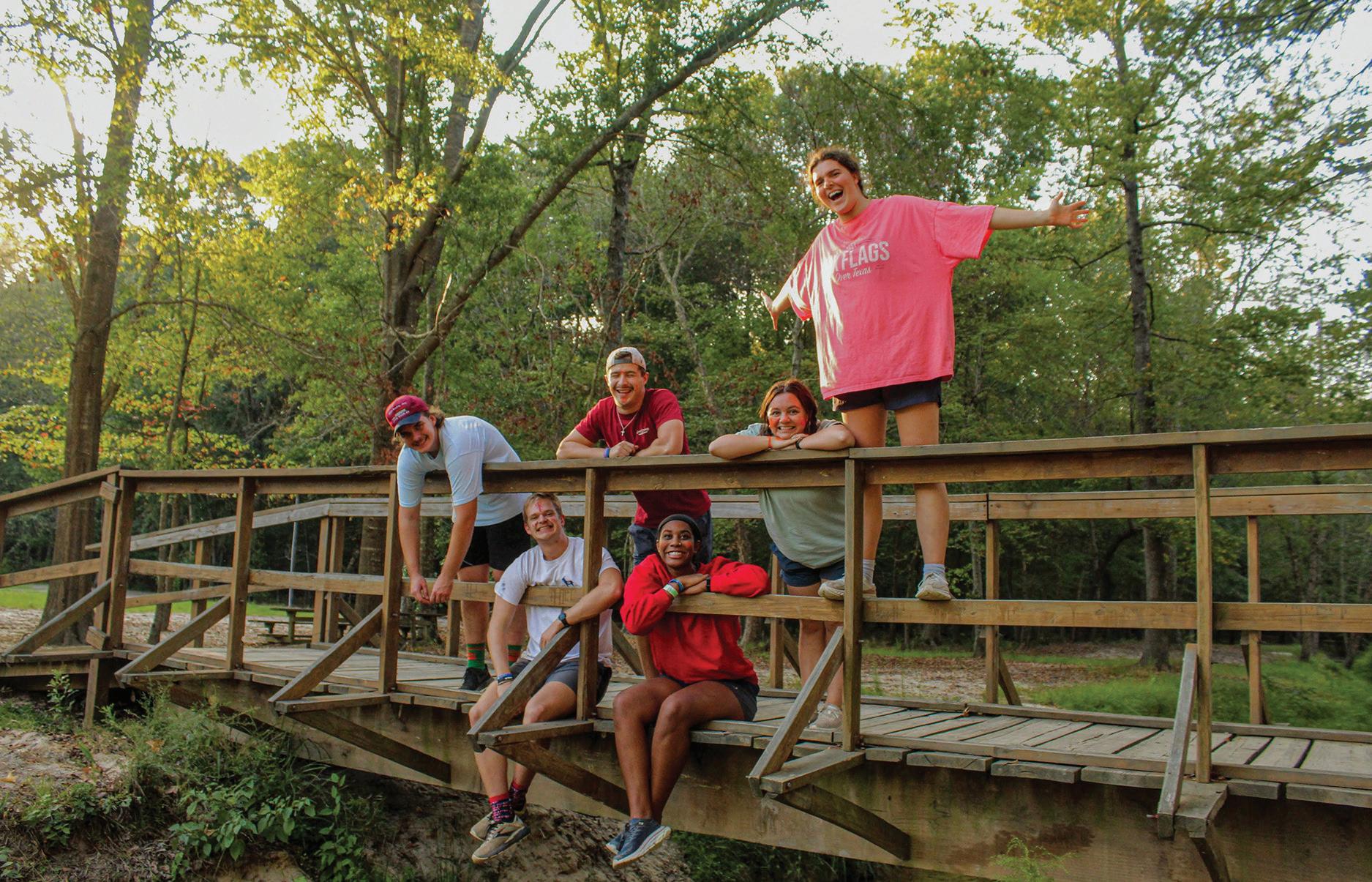
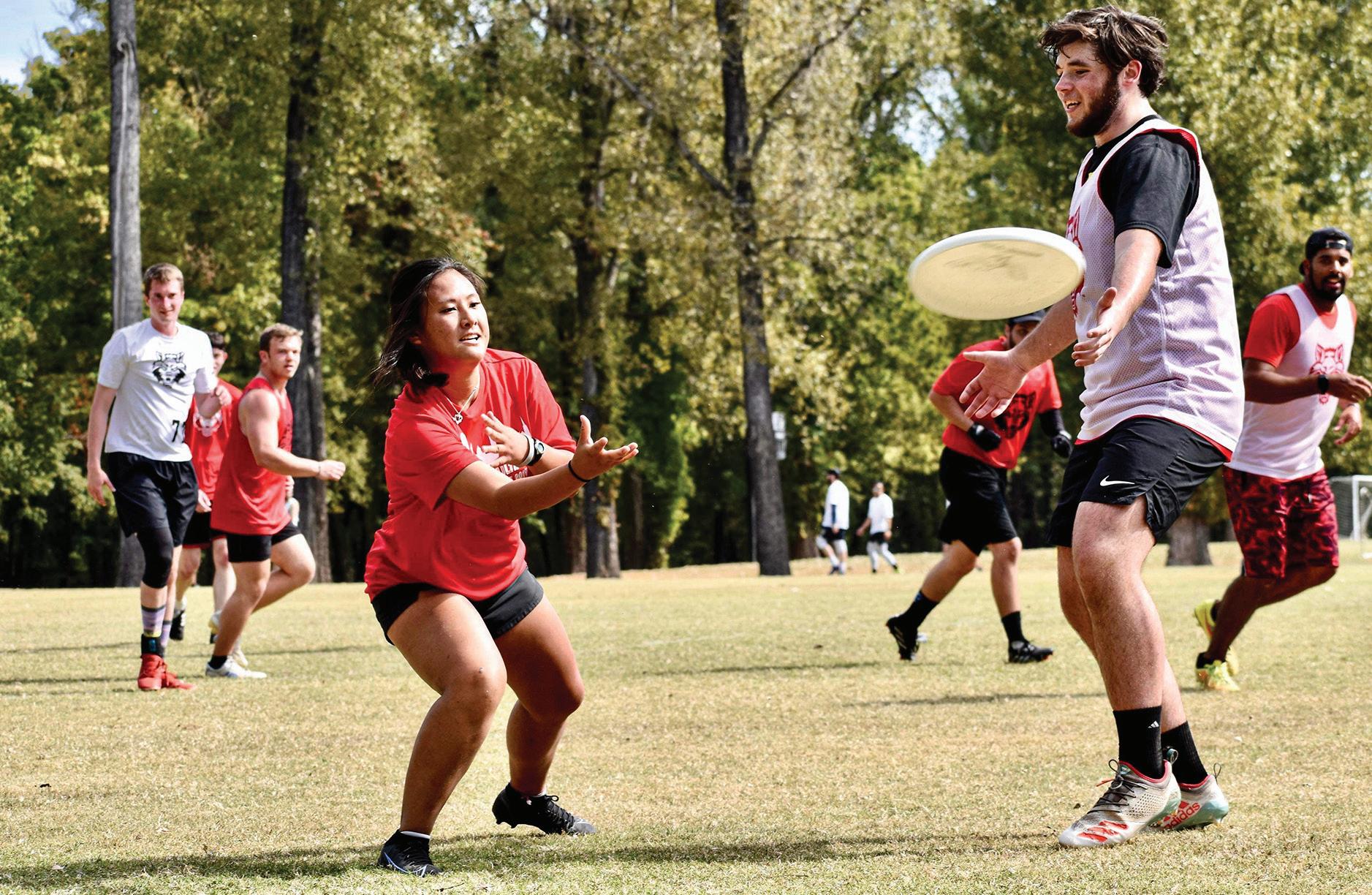

Friday, October 14, 20224B LIFESTYLE
STACY ROIBAL beat reporter
Senior Laney Bell, junior Katie Kirk, and seniors John Howard Hassman and Tyler Davis stand at the geographical center of the continental United States in Kansas.
Junior Regan McClure, junior Bailey Hammond, alumna Alontis Andress, senior Marc Barnett, sophomore Skyler Marcellus-Ojeda, and senior Caleb Hooten at Camp Deer Run in Winnsboro, Texas.
Senior Sophie Balentine and the Harding University Ultimate Frisbee team compete against Arkansas State University.
(Above)
Junior Izzy Cunningham and her grandparents walk through Dogwood Canyon in Branson, Missouri. (Right)
Senior Chip Ashley, freshman Stella Jones, freshman McKinlee Bailey, senior Hayden Bailey, freshman Emma Smith, sophomore Madison Soper, senior Daniel Wolfe, sophomore Aubrey Jones, senior Matthew Floyd, sophomore Magdalene Pruitt, sophomore Mason Smith, junior Molly Housdan and freshman Yuki Fujisawa at Mee Mee’s house in Hoxie, Arkansas.
(Far right)
Sophomores Addyson Prior and Shaelyn Woody and Woody’s parents hike at Devil’s Den State Park in West Fork, Arkansas.
Photo provided by Mary Nan Fincher
Photo provided by Addyson Prior
Photo provided Sophie Balentine
Photo provided by Daniel Wolfe
Photo provided by Laney Bell
Photo provided by Evie Cunningham
Graphic by COOPER TURMAN















 Guest Writer Micah Gill
Guest Writer Micah Gill


















